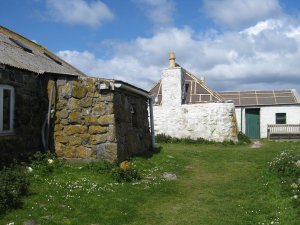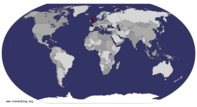Advertisement
Published: June 11th 2009

 Howmore hostel
Howmore hostel
The hut in the foreground is the kitchen/common room, the white one is the bunkhouseAfter following along the endless white sand beaches of the western coast of the western isle of South Uist, I came at last to the Scottish Youth Hostel Association (SYHA)-affiliated hostel in Thob Mhor (Howmore).
I didn't know what to expect of this little hostel. I had tried to make a reservation here when I was at the SYHA in Glasgow, but was told they don't take any, that there was no phone and no internet. 'I think you'll just have to show up,' the young woman at reception told me. And then no other directories at the independent hostels even suggested there was any accommodation in Howmore at all.
Arriving in the small village, which is little more than a post office and petrol station about half way up the long narrow island of South Uist, someone immediately assumed I was looking for the hostel and gave me directions.
This is a pretty remote place. The Western Isles, or Outer Hebrides, are comprised of several islands to make for a long patch of land several kilometres off the western Scottish mainland, west of the Isle of Skye.
Small square stone, concrete or occasionally wood-sided houses spatter

 Howmore hostel
Howmore hostel
Inside the common roomacross the grass-covered sand fields (called 'machaire'), each house a couple hundred metres apart. Between are sheep and cow fields and fenced off but apparently unused land. There is one main road that runs up the centre of the island and it is a single lane track. Evidence of the land clearances and subsequent abandonment abound -- it seems there are more stone ruins of old abandoned houses or huts than there are lived-in ones.
Most people speak gaelic here (pronounced 'gah-lic for the Scots dialect as opposed to the 'gay-lic' of the Irish.) The signs are all written in gaelic and not always translated to English.
I followed the directions down a long track leading to a church near the shore and found a sign saying 'hostel' pointing towards a small collection of stone huts amongst the ruins of an early Christian settlement and monestary dating back as far as the early 800s. Only about 30-50 metres away from the small huts laid a near-complete outline of the old stone walls of an ancient church with crosses from more recent graves (18th and 19th century) scattered between the mostly collapsed walls.
The wind was bitterly cold
that day so I ventured inside one of the huts that had a foot mat leading to an unlocked wooden door. Inside I found a cosy stone cottage -- there was a small table with brochures, a large wooden table surrounded by a bench lined with thin cushions, a hearth stove, a kitchen, toilets and a small room with a single set of bunkbeds, plus one extra bed directly opposite, only 2 feet apart from the bunkbeds. And not a single soul around. I felt like Goldie Locks.
There was a sign indicating prices (£10/night for a bed, £6/night to camp) and a note saying that if you arrive late and there is no warden, then please leave cash payment for your stay in the provided jar. In the uncapped open jar was at least one £50 note and some loose change. As it was only noon, I decided to wait to see if the warden would show up. Meanwhile I leafed through the log book and discovered that many people had stayed here with fully positive experiences. I also learned that the nearby beach was called 'forever beach.'
I wrote my name in the registry book, deciding
on a bed instead of camping, and indicated that I'd be staying four nights -- hoping I wouldn't regret such a long stay. I left my pack in the small bunk room and went back to 'forever beach' to stare into the Caribbean-esque turquoise waters of the North Atlantic ocean.
It was sunny but cold, so I returned to the hut and shortly thereafter a Scottish guy entered the room. He was not the warden, but told me she'd be round at about half-seven (which I presume is 7:30?) He was a relatively young guy -- in his mid/early 30s, I'd guess -- from Glasgow here on a fishing holiday. The cold also brought him in early. Shortly thereafter, two women I recognized from both the hostels in Oban and Barra came in -- one of them is also named Valerie and we'd managed to confuse people at both hostels because of it, so we laughed when we saw each other: 'Valerie!' I shouted when I saw her coming. The two women are cycling through the Outer Hebrides and were exhausted from battling the unusual northeasterly wind (most cyclists choose to go from south to north as the wind
is typically coming from the south).
Soon enough, person after person, couple after couple, entered the small cottage hut until there was barely room to move, around 15-20 in all. I had learned that the adjacent hut was a large bunkhouse with 14 beds and, fortunately, had gone in early and reserved a choice bunk in the far corner of the room.
It started to rain around 5 p.m. so everyone huddled down around the communal table and we made a coal fire in the stove (which smells awful... no comparison to a good wood fire at all), and I played (and won) a couple games of Scrabble with some of the people tightly squeezed at the table.
More than half of those staying that night were in their 60s and almost everyone were cyclists doing 1-2 week cycling vacations. There also were two younger Scottish guys there making a documentary film about crofters (as I understand it, a croft is a small plot of government-owned land that people, crofters, can live on for a minimal rent to do small-scale subsistence farming), plus two men from further north in the Outer Hebrides here for fishing. Many people

 Howmore hostel
Howmore hostel
view of the church ruins from the bunkhousewere English, many Scottish and none (but me) North American. It was a fully British experience. I loved it.
The next day was much warmer and I took a three hour walk northward along the coast, just like I used to do as a child when visiting my grandmother in Bouctouche. There is something so infinitely calming about the vastness and rhythm of the ocean -- especially if you've grown up by it. It's something that I think never really leaves you. You'll always miss the ocean when you are apart from it if it was a childhood friend.
Despite its northerly-ness -- it is much further north here than the Canadian Maritimes, evidenced by the extremely long days (sun up is around 4:30, and even at midnight it is still twilight) -- the coast here doesn't bear much resemblance to the north Atlantic that I'm used to. Rather than the dark turbulent waters I'm familiar with, the waves here are minimal (so far), the water turquoise, and the beaches gleaming white. The grass lands extend all along the western half of the island, while the eastern half looms with black, treeless, giant rock formation mountains. The effect
is very lunar -- like much of the landscape I've seen so far of the Highlands and Islands.
As I stayed in the rustic hostel for four nights, I got to experience different social atmosphere each night as new people came and those staying longer got to know each other better. The subsequent nights were much less busy than the first. Each night everyone would prepare and eat their respective dinners at the wooden table and drink whatever booze they'd bought for themselves at the tiny local store. And then we'd spend the night -- until midnight at least -- talking, drinking and sharing stories.
At several points I'd be the only non-Scot present. This never happens at a regular youth hostel where everyone seems to be Canadian and Australian. So I got to listen to Scottish folks talking about local politics, history (especially the land clearances which are still a topic very present in the Scottish psyche), and their experiences of the Outer Hebrides. I especially loved that many of the Scots, when listening to a story, but also when telling one, will repeat 'aye, aye, ah-ha, ah-ha', which gives a beautiful rhythm to a conversation.
I took several day hikes, including a wonderful 6 hour walk to the island's east coast where you could see the mountains of the Isle of Skye across the water. But really, the best part of my stay was the people.
I met a boisterous young couple, plus their friend who were trying to cycle the islands with no experience at all (rather like my hiking efforts). They were students/alumni of Cambridge University and had convinced a professor friend of theirs who was delivering a lecture on the island to forgo staying in a hotel and join them for the night. They found the idea of him expensing Cambridge £10 for a night in a hostel riotously funny. The film crew guys turned out to be very interesting -- the film's director/narrator had a PhD in conflict resolution and a law degree and had just volunteered to be laid off from his job as a corporate lawyer with a company in Cairo, choosing instead a career in documentary film-making. He was very smart. I befriended a very friendly man from Glasgow, Colm, who had loads of time and no real plan, so he kept adding days to his stay.
Last I saw him he had decided to stay on an extra night to hang out with the film crew guys and a father and daughter from the Scottish Borders who arrived on my last night and suggested a bon fire on the beach for the following night (a plan that I predict failed as there isn't a shread of wood on the island -- even the roofs of the abandoned huts appear to have been piloried long ago.) I decided to keep to my plan to move on and pitched a tent at a similar rustic hostel on the small causeway-linked island of Berneray a two hour bus ride north of Howmore.
Up until now I have wondered if my decision to stick to Scotland all summer was wise -- I'm certainly the only traveller I've met doing this. But now, finally having gotten a taste of being off the regular international track, I'm beginning to experience a different side of Britain through the local people I can meet in these remote areas. It is also a different type of travel: the pace is slower and the atmosphere is more relaxed. The Outer Hebridean locals are also incredibly
friendly and will chat with you on the bus and in the local stores and wave as they pass you on the street. It's really wonderful.
I'm typing/revising this entry from the Isle of Skye and the adjustment back to the regular hostel track is a bit depressing. I'm back in the tourist tract and I miss the Outer Hebrides so much already (and feeling a bit down for having left, truthfully). Fortunately next week I head back to finish the northern half of the Western Isles (Harris and Lewis) where there are three more of these rustic hostels and I definitely plan to spend time at each of them.
Advertisement
Tot: 0.084s; Tpl: 0.019s; cc: 12; qc: 52; dbt: 0.0439s; 1; m:domysql w:travelblog (10.17.0.13); sld: 1;
; mem: 1.2mb











Pat B.
non-member comment
WOW
This sounds so awesome, the country-side, the people, the experience. What an adventrue.